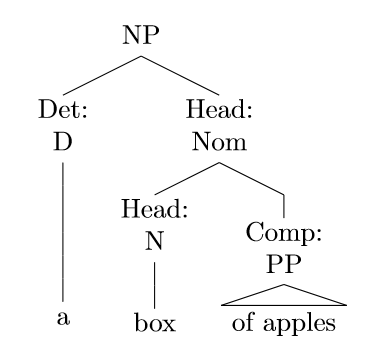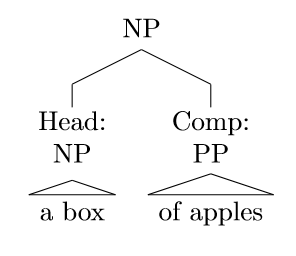The standard linguistic analysis of the NP
a box of apples
is that we have a determiner (a) which acts on (modifies?) box of apples. (For an example of standard analysis, see e.g. Fig. 6 here). CGEL refers to box of apples as a nominal, though I understand that others would prefer to call it an NP'. Then box of apples is further parsed into box being modified by of apples. In other words, we have
My question is: what is the evidence against the following alternative parsing: a box being modified by of apples?
In other words, why does
a [box [of apples] ]
make more sense than
[a box] [of apples]?
Equivalently: why is a taken to modify box of apples rather than of apples taken to modify a box?
What is particularly impressive (or surprising) is that, on the standard analysis, the parsing seems to be completely independent of context. It is simply never the case that a box gets modified by of apples; it is always box being modified by of apples, and then a modifying box of apples.
I hope it is understood that I'm only mentioning a box of apples for the sake of concreteness. What I would like to know is why such a parsing applies in all relevantly similar cases. In other words, my actual question is: consider an NP which is Det + Head + PP. Why is Det taken to modify Head + PP, rather than PP taken to modify Det + Head?
I'm sure there is more than one piece of evidence, and would appreciate it if someone could explain the first several strongest pieces of evidence.
(In contrast, I find the standard parsing far more intuitive in the cases of NPs which look like Det + Mod + Head, e.g. an old man. The correct parsing is, of course, an [old man], and somehow I don't have the slightest inclination to parse it as [an old] man.)
Update 1: found a page that seems to say something relevant on the issue: this one. Still digesting it...
Update 2: I have accepted the answer given by Greg Lee. (Thanks!) The answer uses the notion of a pro-form. A pro-form is a particular type of function word---"a word that has little lexical meaning or has ambiguous meaning, but instead serves to express grammatical relationships with other words within a sentence, or specify the attitude or mood of the speaker" (Wikipedia). For completeness, here are details (also from Wikipedia):
A pro-form is a type of function word or expression that stands in for (expresses the same content as) another word, phrase, clause or sentence where the meaning is recoverable from the context. They are used either to avoid repetitive expressions or in quantification (limiting the variables of a proposition).
Pro-forms are divided into several categories, according to which part of speech they substitute:
- A pronoun substitutes a noun or a noun phrase, with or without a determiner: it, this. (Compare also prop-word; this denotes a word like one in "the blue one".)
- A pro-adjective substitutes an adjective or a phrase that functions as an adjective: so as in "It is less so than we had expected."
- A pro-adverb substitutes an adverb or a phrase that functions as an adverb: how or this way.
- A pro-verb substitutes a verb or a verb phrase: do.
- A pro-sentence substitutes an entire sentence or subsentence: Yes, or that as in "That is true".
Now the answer by Greg Lee is easy to follow (some of the emphases are mine):
One generally assumes that only constituents can be replaced by a pro-form and that only a constituent can be the antecedent for such a replacement. So since we can go from
I want a big box of apples, but my sister wants only a small box of apples.
to
I want a big box of apples, but my sister wants only a small one.
then "box of apples" must be a constituent. This rules out the structure: [a (Adj) box] [of apples]. It must be instead: a (Adj) [box of apples].
Once this answer was posted, it was easy to find other resources that discuss this; one of them is here.


